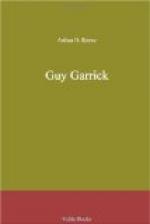“I understand,” I agreed, vaguely.
“Now,” he went on, “this property of selenium is used for producing or rather allowing to be transmitted an electric current which is interrupted by a special clockwork interrupter, and so is made audible in this wireless telephone receiver which I have here connected with this second box. The eye is replaced by the ear as the detector of light—that is all.”
It might have been all, but it was quite wonderful to me, even if he spoke of it so simply. He continued to adjust the thing as he talked.
“The clockwork has been wound up by means of a small handle, and I have moved that rod along a slit until I heard a purring sound. Then I moved it until the purring sound became as faint as possible. The instrument is at the present moment in its most sensitive state.”
“What does it sound like?” I asked.
“Well, the passage of a hand or other object across the aperture is indicated by a sort of murmuring sound,” he replied, “the loudest sound indicating the passage of the edges where the contrast is greatest. In a fairly bright light, even the swiftest shadow is discoverable. Prolonged exposure, however, blinds the optophone, just as it blinds the eye.”
“Do you hear anything now?” I asked watching his face curiously.
“No. When I turned the current on at first I heard a ticking or rasping sound. I silenced that. But any change in the amount of light in that dark room over there would restore the sound, and its intensity would indicate the power of the light.”
He continued to listen.
“When I first tried this, I found that a glimpse out of the window in daylight sounded like a cinematograph reeling off a film. The ticking sank almost into silence as the receiving apparatus was held in the shadow of the office table, and leaped into a lively rattle again when I brought it near an electric-light bulb. I blindfolded myself and moved a piece of blotting paper between the receiver and the light. I could actually hear the grating of the shadow, yes, I heard the shadow pass. At night, too, I have found that it is even affected by the light of the stars.”
He glanced out of the window in the direction of Warrington’s, which we could not see, however, since it was around an angle of the building.
“See,” he went on, “the moon is rising, and in a few minutes, I calculate, it will shine right into that room over there on Seventy-second Street. By using this optophone, I could tell you the moment it does. Try the thing, yourself, Tom.”
I did so. Though my ear was untrained to distinguish between sounds I could hear just the faintest noise.
Suddenly there came a weird racket. Hastily I looked up at Garrick in surprise.
“What is that?” I asked endeavouring to describe it. “Are they there now?”
“No,” he laughed. “That was the moon shining in. I wanted you to hear what a difference it makes. When a ray of the sun, for instance, strikes that ‘feeler’ over there, a harmonious and majestic sound like the echo of a huge orchestra is heard. The light of the moon, on the other hand, produces a different sound— lamenting, almost like the groans of the wounded on a battlefield.”




